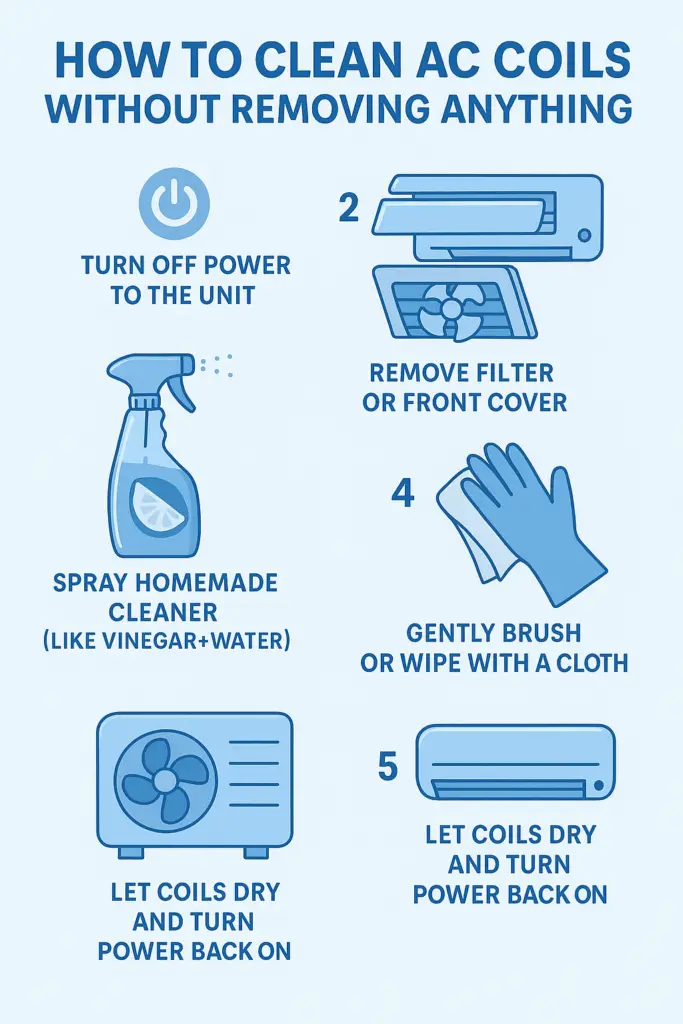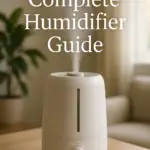Table of Contents
How to Clean AC Coils Without Removing the Unit – No Tools Needed
Cleaning your AC coils is essential for maintaining efficiency and preventing breakdowns, but you don’t need special tools or technical skills to do it. With simple household items and these easy methods, you can clean both indoor and outdoor AC coils without removing any parts. This guide is perfect for renters, beginners, or anyone who wants to maintain their AC without professional help.
 Why Clean Your AC Coils Without Disassembly?
Why Clean Your AC Coils Without Disassembly?
Many people avoid cleaning their AC coils because they think it requires dismantling the unit. The truth is you can effectively clean most coils without removing them or using special tools. Regular cleaning improves cooling performance, reduces energy bills, and extends your AC’s lifespan.
If you’re not sure whether your coils need cleaning, check out our guide on how to tell if your AC coils are dirty for common symptoms to watch for.
Safety First: Precautions Before Cleaning
✔️ Turn Off Power to the Unit
Always turn off power at the breaker before cleaning. This simple step prevents electrical shocks and protects your AC system.
✔️ Wear Protective Gloves
Coils have sharp edges that can cut skin. A pair of rubber gloves protects your hands while cleaning.
✔️ Avoid Pressure Washers
High-pressure water can bend delicate coil fins. Stick to gentle spraying or wiping methods instead.
Tool-Free Methods for Cleaning Indoor Coils
1. The Vinegar Spray Method
White vinegar is a natural cleaner that dissolves dirt and kills mold. This is one of the safest and most effective methods for indoor coils.
- Mix equal parts white vinegar and water in a spray bottle
- Remove the access panel (usually held by simple clips)
- Lightly spray the solution onto the coils
- Let sit for 5-10 minutes
- Wipe away loosened dirt with a soft cloth
2. Soapy Water Wipe Down
For light dirt buildup, mild soap works perfectly. This gentle method won’t damage sensitive components.
- Mix a few drops of dish soap with warm water
- Dip a soft cloth or sponge in the solution
- Gently wipe the coil surfaces
- Use a dry cloth to remove excess moisture
Easy Outdoor Coil Cleaning Without Tools
1. Garden Hose Rinse Technique
Your garden hose can clean outdoor coils if used correctly. Always spray at an angle to avoid bending the fins.
- Remove loose debris by hand first
- Set hose nozzle to “shower” or gentle spray
- Spray from the inside out at a 45-degree angle
- Let the unit dry completely before restarting
2. Hydrogen Peroxide Deep Clean
For stubborn grime on outdoor units, hydrogen peroxide works wonders. It’s more powerful than vinegar but still safe for coils.
- Mix 1 part 3% hydrogen peroxide with 2 parts water
- Spray onto coils and let bubble for 5 minutes
- Rinse gently with your hose
Natural Cleaning Solutions to Try
You don’t need harsh chemicals to clean AC coils effectively. These DIY solutions work great and are safe for your home environment. For more options, see our homemade AC coil cleaner recipes.
| Cleaner | Best For | Mixing Ratio |
|---|---|---|
| White vinegar | Indoor coils, mold | 1:1 with water |
| Dish soap | Light dirt | Few drops per gallon |
| Hydrogen peroxide | Stubborn grime | 1:2 with water |
| Baking soda | Odor removal | 2 tbsp per cup water |
After Cleaning: Important Next Steps
✔️ Let the Unit Dry Completely
Moisture can cause electrical issues. Wait at least 30 minutes before restoring power.
✔️ Replace the Air Filter
A clean filter prevents quick recontamination. This simple step extends your cleaning results.
✔️ Monitor Performance
Notice if cooling improves after cleaning. This helps you determine your ideal cleaning schedule.
When to Consider Professional Help
While these methods work for most routine cleaning, sometimes you need more advanced care. Call a professional if you notice any of these issues:
- Bent or damaged coil fins
- Ice buildup after cleaning
- Strange noises when the unit runs
- No improvement after cleaning
For more thorough cleaning, you might want to explore the best AC coil cleaning brushes and tools for future maintenance.
Maintenance Tips to Keep Coils Clean Longer
✔️ Regular Filter Changes
A clean filter prevents dust from reaching coils. Change filters every 1-3 months during cooling season.
✔️ Keep the Area Clear
For outdoor units, maintain 2 feet of clearance. This improves airflow and reduces debris accumulation.
✔️ Schedule Annual Cleaning
Mark your calendar for seasonal maintenance. Twice-yearly cleaning prevents major buildup.
Final Thoughts
Cleaning your AC coils doesn’t require special tools or technical expertise. With these simple methods, anyone can maintain their air conditioner’s performance and efficiency. Regular cleaning with safe, homemade solutions keeps your cooling costs down and extends your unit’s lifespan.
For more detailed cleaning recipes, visit our guide to easy coil cleaning recipes using common household ingredients.





